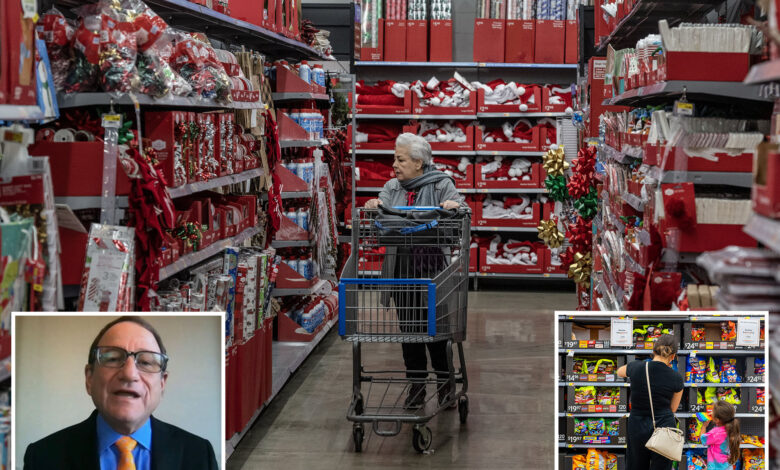Ex-Target exec says holidays to disappoint, shoppers ‘running out of money’

Former Target vice chairman Gerald Storch on Thursday warned that holiday spending will likely disappoint this year as inflation-battered consumers run low on savings and scrimp on spending due to geopolitical uncertainties.
“It’s very clear that consumers are running out of money,” Storch, also the former CEO of Toys ‘R’ Us in the 2000s and early 2010s, told Fox Business. “They’re increasingly stressed by inflation and the exhaustion of their pandemic-era savings.”
When asked about his expectations for the holiday shopping season this year, Storch was blunt: “[I don’t expect] too much, frankly.”
Storch cited sticky inflation that has kept prices high — putting strain on consumers’ wallets — and a tense geopolitical atmosphere, as former President Donald Trump and Vice President Kamala Harris remain neck and neck ahead of the election and wars rage in Gaza and Ukraine.
The longtime retail executive’s grim warning comes soon after a bout of strong economic data.
Retail sales rose 0.4% in September, beating expectations and painting a picture of a resilient consumer, according to a report from the Commerce Department released Thursday.
While jobless claims saw a boost soon after Hurricane Helene wreaked havoc across the Southeastern states, the number of Americans filing claims unexpectedly fell last week in another good sign for the economy.
But Storch said these figures are not so comforting when they are put in context.
“When you take a look over the last several years, what you see month after month, everyone talks about, the consumer’s still spending,” he said. “They might be, but they’re spending less than the growth of inflation.”
While retail sales have grown by 1.7% over the past year, for example, the rate of inflation was 2.4% in the same period, Storch said.
So consumers are “spending more and getting less” as prices rise quicker than sales, he said.
US holiday sales are expected to grow as much as 3.5% this year, the National Retail Federation forecast on Tuesday.
While that forecast signals sales growth, it predicts the slowest rate of growth in six years.
NRF CEO Matthew Shay said he expected consumers would be price-conscious and pragmatic, prioritizing discounts and deals as they hunt for holiday gifts.
“I would think that [if] we can get growth in [the] 2.5% range, that’d be doing pretty well, and that’s not very good,” Storch told Fox Business. “In the heydays there, we’d really want to see something that’s more like 4% type of growth.”
Hitha Herzog, chief research officer at H Squared Research and part-time faculty at Parsons School of Design, said an oversaturated retail environment with tons of promotions will not convince cost-conscious customers to spend big.
“Prices remain high for basic items such as grocery, fuel and clothing. Sticker shock does not bode well for discretionary purchases specifically around the holidays,” Herzog told The Post.
“If the consumer has to choose between paying for Thanksgiving dinner or participating in Black Friday shopping, the consumer will allocate their budget towards food versus gifts,” she said.
If a pullback in consumer spending isn’t enough of a challenge for retailers, they are also facing a particularly tight holiday season.
“You have, by the way, the shortest holiday season you can even imagine, so that’s against retailers,” Storch said. “Now and the time between Thanksgiving and Christmas is very, very short, so that’s going to be bad.”
Consumers are likely to grow more cost-conscious as geopolitical tensions brew in the US and around the world.
“The election’s going to weigh on things and the geopolitical situation as well, so I think it’s going to be a pretty weak Christmas,” Storch said.
Meanwhile, retailers are already in a weak position as they prepare for a grueling holiday season.
Pharmacy chains — including Rite Aid and CVS — have been shuttering stores. Just this week, Walgreens said it will be closing 1,200 stores over the next three years.
Home furnishing chains like Big Lots and LL Flooring have filed for bankruptcy and shared plans to close stores.
And Dollar Tree is planning to close nearly 1,000 of its discount stores.
“A lot of these retailers expanded very rapidly. Walgreens has like 4,000 stores — it’s incredible. Same thing for Family Dollar,” Storch said. “That big bet on physical locations [came] just as the consumer was slowing down, and, of course, the internet’s been growing.”




